Gambling in the United Kingdom
Introduction
According to the Latest Casino Bonuses, the United Kingdom has 139 "gambling facilities." Of them, 120 are in England, and 24 of those are in London. There are 13 in Scotland and five in Wales. In February, 2014, I visited London and had a look at several of them.
One of my forum members, Charles Patrick, lives in England and has been to most of the casinos in the UK. He contributed to this article.
 Ohio Recommended Online Casinos
View All
Ohio Recommended Online Casinos
View All
History
Bingo and sports betting have been legal in the United Kingdom for a long time. Prior to 1968, many small casinos operated, though it was neither legal nor illegal (similar to how casinos operate in Ireland today); typically, chemin de fer was played by the aristocracy in large private houses. In 1968, the Gambling Act legalized casinos, and since then laws have been gradually relaxed to allow longer opening hours, new table games, and larger casinos. Casinos that operate under 1968 rules are allowed a maximum of 20 slot machines. The Gambling Act of 2005 introduced "regional casinos" and allowed more areas where they could operate. These casinos have to be bigger and are then allowed to have more slots and gaming tables.Casinos
Casinos in London are small affairs compared to the gigantic Las Vegas casinos I'm used to. They typically have 5 to 20 table games and most are limited to 20 slots with a maximum prize of £10,000 (or £20,000 if linked) for up to a £5 stake. Historically, the largest casino in England was Grosvenor Victoria casino with 36 table games. In the last few years, Aspers have opened two "regional casinos" and these have more slots than the Victoria.There are a few provincial casinos that cater to the youth market and provide entertainment on weekends, but like every other casino in Europe I've seen, most casinos do not emphasize a fun and festive atmosphere. Rather, they are no-nonsense and down to business. If there is any background music at all, expect it to be soft and relaxing. Other than a bar and a restaurant, there isn't much to do in English casinos besides gambling.
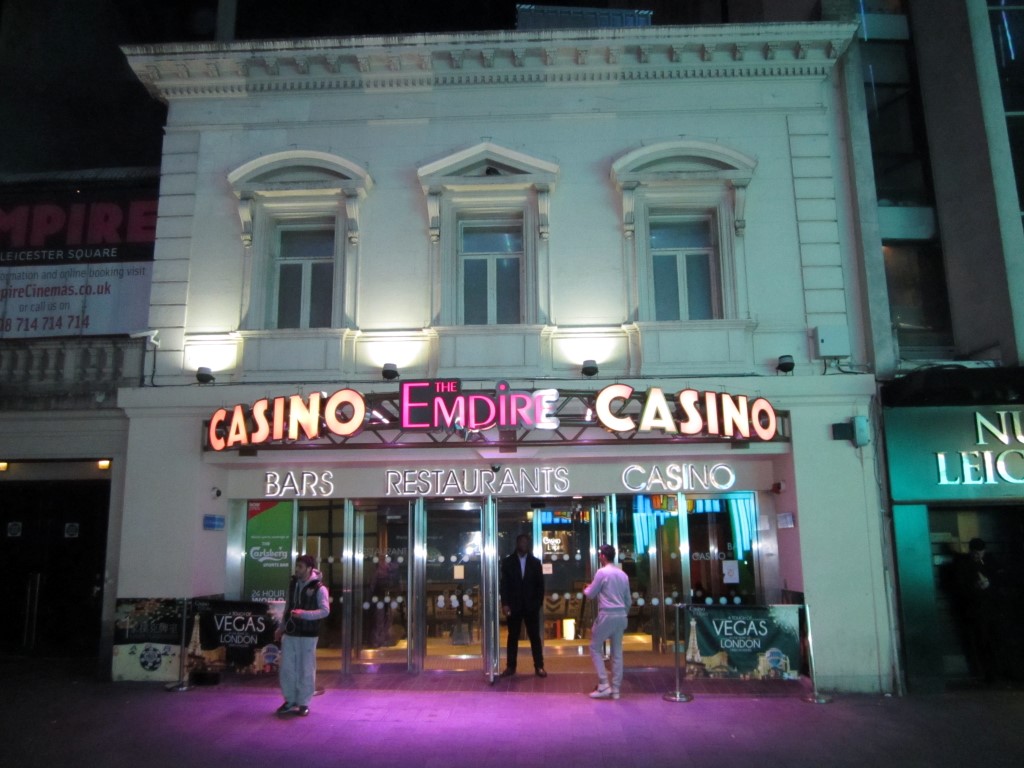
Casino of the Empire
In all things, people dress a little more formally in England than they do the US, and this includes casinos. However, it isn't so stuffy that a jacket and tie are required, at least in my experience. For the men, you'll be in fine shape with pleated pants, a collared shirt, and leather shoes. In most casinos you could get by with even less, but I think it shows respect for an establishment to dress appropriately. Some casinos are more formal than others. At one point I stumbled into the small Park Tower Casino, near Buckingham Palace, and that one was definitely more formal. At the casinos in Piccadilly Circus and the Aspers casino in Stratford the dress code was much less formal. At the Grosvenor Casino in Chelsea my friend felt it was cold so sat at the blackjack table wearing a ski cap. The manager politely asked him to remove it. Although other customers were wearing turbans the manager didn't buy the argument that my buddy was a druid and the ski cap was an essential component of that religion.
Historically, casinos could only open from 2pm to 4am; however, nowadays most of the larger casinos are open 24 hours. If you're outside London, then beware that some may not be 24-hour. All casinos are closed Christmas Day and many close during the morning of New Year's Day.
Gambling in Scotland and Wales are very similar to that in England. The main difference is opening hours, in particular on Sundays and holidays. There are no legal casinos in Northern Ireland.
See below for more information about the specific games you'll find in the casinos of England.
Casino Membership
Until recently, it was required to have a membership to play in a casino. Membership was usually free, but a 24-hour waiting period was enforced. Many Websites incorrectly continue to maintain this is the law. Today, many casinos require “registration," but it takes only a few minutes to sign up and there is no waiting period. Some encourage registration but don't require it, while others just let any respectable-looking person walk in without question. There are only so many different companies that run casinos, so membership in one will usually allow entrance to all other sister casinos.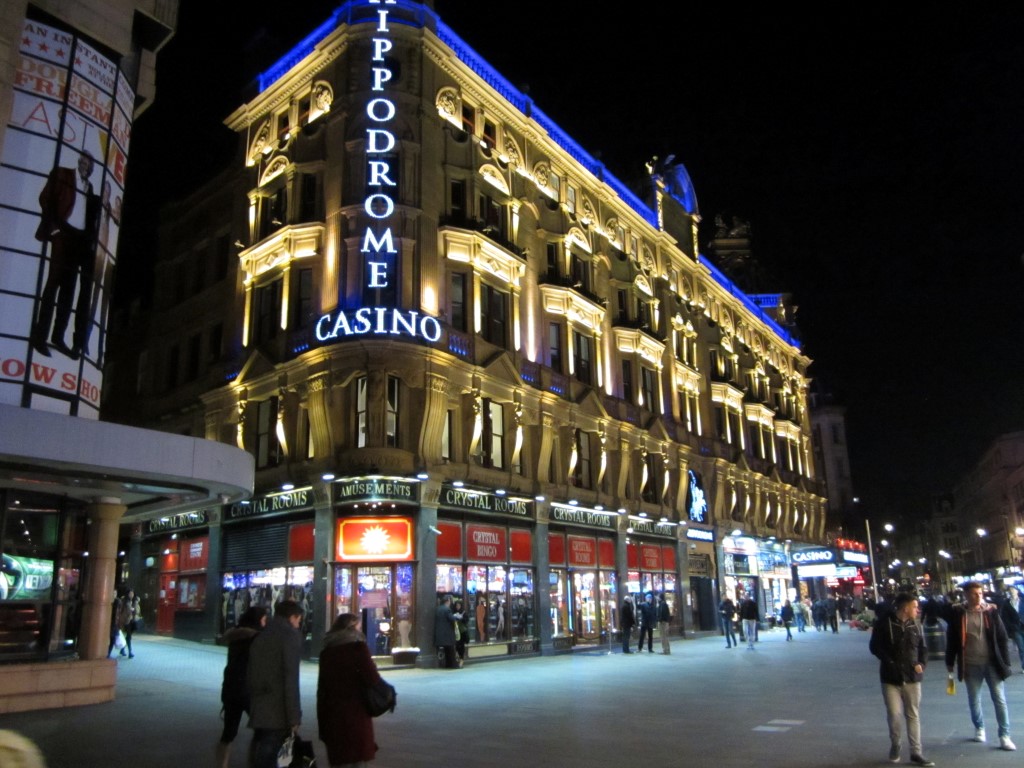
Hippodrome
- No registration - like Aspers or Las Vegas, anyone can walk in, no need to say who you are.
- Registration - like the old days, everyone has to be a member - some elite London casinos are by invitation only. At Crockfords not only must your application be accepted but you also pay a £1,000 membership fee.
- Hybrid - most people have to be a member but sometimes people without ID are let in, typically this would only be a group of four for the restaurant where two are members but the other two are guests.

Table Games
RouletteRoulette is, without any doubt, the most popular casino game in England. In any given casino, expect about half the tables to be roulette. Much to my delight, almost all tables follow European rules, meaning only one zero, and if the ball lands in zero, then even-money bets lose only half. The house edge on even money bets is 1.35% and on all others is 2.70%. For this reason, I recommend betting on the even money bets of red, black, odd, even, low (1-18), and high (19-36).
Beware that American double-zero roulette is creeping into some casinos. You will find this is at Aspers and LCI only, which are operated by Caesars Entertainment (formerly known as Harrah's), rather than the big UK chains. Typically the double-zero is used for lower minimum stakes, e.g. 50p rather than £1. I think they at least follow the Atlantic City rule of losing only half on zero or double-zero. Assuming that is the case, then the house edge is 2.63% on even money bets and 5.26% on all others. Unless the minimum bet is prohibitively high in European roulette, I would have nothing to do with its American cousin.

Napoleons
The Casino at the Empire had a set of seven side bets based on Chinese icons. Somehow a winning one is chosen based on the speed and location of the ball. Depending on the symbol, wins pay even money to 80 to 1. According to game literature, the house edge ranges from 11.01% to 13.72%.
Blackjack
After roulette, blackjack seems to be the number two table game in England. The rules are consistent as follows:
- Usually four to six decks, but I saw eight decks once.
- Dealer stands on soft 17.
- No dealer hole card. Player loses everything if dealer gets a blackjack.
- Double after split allowed.
- Surrender not allowed.
- Infinite re-splitting, including aces.
- Most casinos hand shuffle, with about 75% penetration, but some use a continuous shuffler.
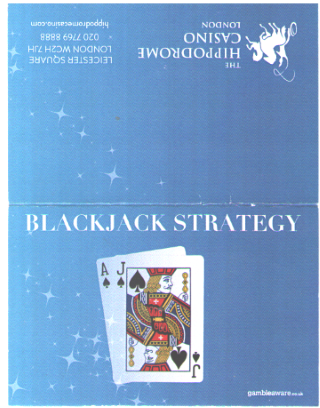
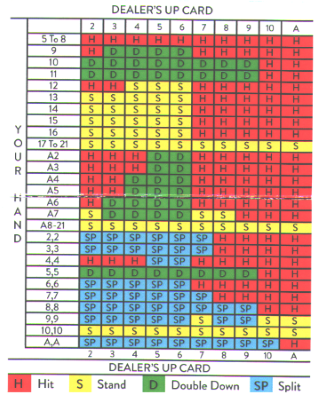
If you're used to my own formatting, please see my UK Basic Strategy.
For their effort to teach players to play blackjack properly, I say if you're ever in
The house edge under these rules, assuming six decks, is 0.47%.
You may find some outdated websites that incorrectly say that splitting the three Fs (fours, fives, and faces) is not allowed in the United Kingdom. Effective September 1, 2007, players are allowed to split any pair and make soft doubles.
Nearly every Blackjack table has a side bet or two. Here are some of the ones I noticed.
- Perfect Pairs. They follow the 5-12-30 pay table with four decks for a house edge of 6.76% and 5-10-30 with six decks for a house edge of 5.79%.
- 21+3. If the players initial two cards and the dealer's up card form any paying three card combination then the wager pays 9 to 1. House edge is 3.24% based on six decks.
- Top 3. If the players initial two cards and the dealer's up card form a straight flush or three of a kind then the wager pays from 90 to 270 to 1. House edge is 11.07% based on six decks.
Punto Banco
"Punto Banco" is the same thing as American baccarat and is the traditional version playing 19/20 on the Banker. Depending on where you play, the game can be dealt on a "midi" table, meaning players handle the cards at a table a bit larger than a blackjack table, or in the larger clover-leaf one in the Victoria. The rules are the same except some games offer various additional Egalite bets, which are wagers on a specific tie. The following table shows what each Egalite pays, the probability, and expected return.
UK Egalite Bets
| Egalitie | Pays | Prob | Return |
|---|---|---|---|
| 9 | 80 | 0.011033 | -0.106348 |
| 8 | 80 | 0.010979 | -0.110669 |
| 7 | 45 | 0.020350 | -0.063899 |
| 6 | 45 | 0.019240 | -0.114952 |
| 5 | 110 | 0.007939 | -0.118732 |
| 4 | 120 | 0.007261 | -0.121401 |
| 3 | 200 | 0.004452 | -0.105243 |
| 2 | 225 | 0.004003 | -0.095412 |
| 1 | 215 | 0.004101 | -0.114150 |
| 0 | 150 | 0.005798 | -0.124527 |
As you can see, the house edge ranges from 6.39% to 12.45%. This is lower than the any tie bet, at a house edge of 14.36%. Rather than betting the tie, I would suggest splitting whatever you would have bet on the various Egalities, preferably on the seven. However, you'll still do much better to stick to the Player and Banker bets only, especially the Banker.
I also saw a side bet titled "3 giving 8." It won if the (1) the Player drew a third card of an 8 and (2) the Banker had a two-card total of 3. The odds of this are 1 in 220. The bet pays 180, for a house edge of 17.77% (ouch!). Some other Websites claim this bet pays 200 to 1. Should you find that, and I think it is an outdated rule, the house edge would drop to 8.68%.
There is also Punto 2000, which is a variation which pays even money on the Banker bet, except a winning Banker six pays 1 to 2.
Three Card Poker
Every casino in the UK now has the three basic games: Roulette, Blackjack and Three Card Poker. Originally seen on the Isle of Man as "Brag," after deregulation, it has become the most popular new table game. They follow the usual 1-4-5 Ante Bonus rules, and the pay table on the Pairplus is 1-4-6-33-35, for a house edge of 2.70%. This is much better than the American 1-3-6--30-40 pay table, with a house edge of 7.28%.There is also a seldom-seen side bet in the U.S. called the "Prime." It pays 3-1 if your cards are all the same color, or 4-1 if yours and the dealers are all the same color. The house edge on that is 3.62%.
Craps
Craps is known as just "dice" in the UK. It is not easy to find in the UK, but there are a few tables in London and a couple in Manchester. Most tables are full sized, but occasionally you'll find smaller tables. Gala had a simplified version, but that has now gone away.
If you're into the sucker bets, then the UK is a great place to play craps. The rules are the same as in the U.S., except the proposition bets pay much more and all place/lay bets have their own odds. The player may usually bet single odds (although one casino allows 2x and another 3-4-5x) and the field bet goes by the Vegas downtown rules of paying 2 to 1 on a 2 and 3-1 on a 12.
There are several differences between UK and American craps on the other bets:
Hop Bets
UK: Easy hops pay 16 to 1 for a house edge of 5.56%. US: Easy hops pay 15 to 1, at best, for a house edge of 11.11%.
UK: Hard hops pay 33 to 1 for a house edge of 5.56%. US: Hard hops pay 30 to 1, at best, for a house edge of 13.89%.
Hard Ways
UK: The hard 6 and 8 pay 9.5 to 1 for a house edge of 4.55% US: The hard 6 and 8 pay 9 to 1 for a house edge of 9.09%
UK: The hard 4 and 10 pay 7.5 to 1 for a house edge of 5.56% US: The hard 4 and 10 pay 7 to 1 for a house edge of 11.11%
Lay/Wrong Place Bets
Unlike American craps with lay bets, the UK version has don't place bets, also known as "wrong place bets." Here is what they pay and the house edge.
6 and 8 pay 4 to 5 for a house edge of 1.82%.
5 and 9 pay 5 to 8 for a house edge of 2.50%.
4 and 10 pay 5 to 11 for a house edge of 3.03%.
Working
UK: Come odds and Place bets do not work on the Come out. Lay bets and Don't bets work.
UK: It's not universal whether Hard Ways work on the come out, so always better to ask.
Pai Gow Tiles
There are only three casinos in the center of London that have pai gow tiles. It is not a co-incidence that they are near China Town and the game, as usual, attracts a mostly Asian customer base. If the table isn't open, don't be shy about asking a supervisor to open it for you. Casinos use a fairly standard house way, which is generally posted on the wall somewhere, along with the rules of every other game. As in the U.S., the turn to bank rotates around the table.
Other Games
London does not seem to be so open to new games as casinos in the provinces. Out of town, you can stumble across many poker variants. Ones that are popular in the US, such as Casino Stud Poker, Let It Ride, Pai Gow Poker, have all but died out. Others variants sometimes stay in the odd casino, for instance XX Poker can be found in Stockton but nowhere else.
- Spin to Win: This is similar to the American game "Big Six."
- House Money: I believe this new game got its start in London and from there spread to the U.S., where I saw it at the Golden Nugget in Las Vegas.
- Casino War: This can be found in a few casinos and is, in my humble opinion, more successful here than I've seen in the US.
Live Poker
Some casinos have a specific poker room with many tables, some have only one or two poker tables, and a few have none. The game is usually no-limit Texas Hold 'Em. There are cash games - in the larger poker rooms there is a screen showing the game, the blinds and the rake - and the waiting list. Many casinos also run daily tournaments, typically starting at 8pm and ending by 2am. They are various formats, rebuy, freezeout etc. The casino levies an upfront charge (e.g. £50+£5).
As just one example of the no-limit cash games, at the Aspers Casino in London there were two tables, as follows:
- Blinds of £1 - £1. 10% rake up to maximum of £5.
- Blinds of £1 - £2. 5% rake up to maximum of £10.
Normally I don't like to update a blog entry, but I got so much feedback about the slots in the UK that I had to revise what I wrote originally. I've been writing about slot machines since 1997, and one of the most frequent questions I get is about UK "fruit machines." In particular, some machines there do not offer the same odds every spin but adjust the odds continuously to achieve short-term return targets. I must have been asked specifically how they work hundreds of times. While I can't answer the question completely, let me tell you what I do understand.
First, not every slot machine in the UK is what I'll refer to as a Fruit Machine, which use some form of "adaptive logic" to achieve short-term win goals. The ones in the casinos are much like the ones you see in Las Vegas, although with some limits on the maximum bet and jackpot size. To be specific, there are various classes of machines, as follows:
- Class A — Don't exist
- Class B1 — These are the most Vegas-like slots and found in casinos only. Maximum win of £10,000.
- Class B2 — These are multi-game machines often found in race and sports betting parlors. A reeled slot game in this class will have smaller jackpots than a B1 machine. Maximum win of £500.
- Class B3, B4, C — These are the Fruit Slots typically found in pubs.
- Class D — These are amusement only games that you might find in an arcade. For example, a claw game where you try to win a teddy bear.
"But how does it do this?" I hear you asking. Other websites contradict each other about this so I looked at an actual patent that covered the technology,UK 2087618-A. It mentions that the probability of the player achieving certain features and bonuses in the game is dependent upon the recent payout return percentage. Thus, the player is more likely to win the features and bonuses if the game has been underpaying in its recent history. How far back it goes, I don't know, but I believe it to be about a week, depending on how much the machine gets played.
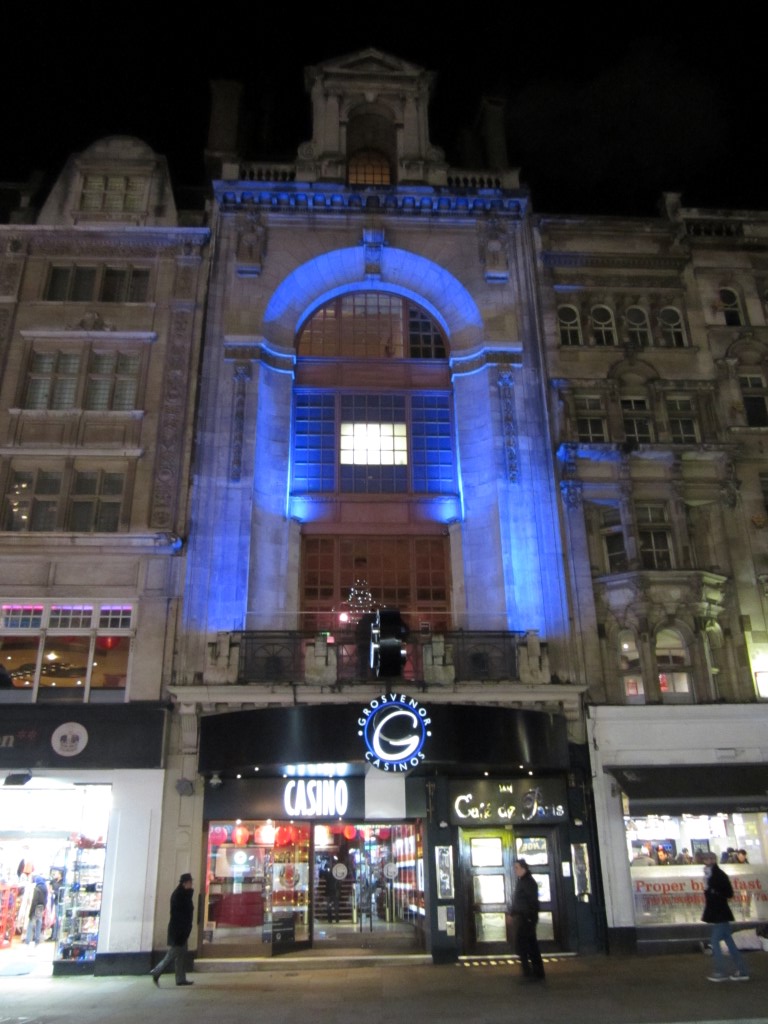
Grosvenor Casino
You can expect to find other websites out there claiming Fruit Machines are entirely non-random, implying or stating outright the games have a predestined sequence of wins. Others say these machines have a pool of possible wins in a predefined batch that come out one at a time, like a US pull-tab game or "drawing lots" in the bible. According to this theory, once an outcome is removed, it can't be won again but the game otherwise randomly chooses from the remaining outcomes. Let me say that I believe these sources to be in error. For one thing, they contradict the patent I linked to earlier.
In conclusion, that is about the best I can do on that topic. Would I like to explain exactly how these machines work, as I have done for several American slot machines? Yes. Can I? No. If any slot engineer who has ever worked on a Fruit Machine should read this, please contact me. I would love to pick your brain on the topic. While I haven't taken this as far as I wanted, I hope you know more about Fruit Machines than you did ten minutes ago.
Race and Sports Betting
In Britain, both on-course and off-course bookmaking is legal.
 Ohio Recommended Online Sports Books
Ohio Recommended Online Sports Books
On-Course
There is a wide variety of racetracks in Britain. Unlike the US and Europe, there are usually over twenty bookmakers at each racetrack, so racer-goers can either bet with them or directly through the track, known as the "tote." Each bookie offers its own odds for each horse; formerly these were on blackboards, hence the term “Board Prices." With a bookmaker, the odds are locked in betting against a bookmaker, while betting through the "tote" is like how it is done at a U.S. racetrack, where the odds are not calculated until the race is over.
Off-Course
There are many betting shops and any reasonable High Street (equivalent to the US Main Street) will have one or two. Typically, they are the size of a small shop. There are a handful of major companies who run most of them, although a few independent ones survive - this is similar to casinos. These bookmakers show live racing from across Britain and other countries. Before the race, a "Live Show" is sent out using the average of “board prices;" this is updated if the on-course prices change. You can take these prices just as if you were on the racetrack (write it on your betting slip). If you don’t take a price, then the bet is settled at SP ("Starting Price"). Rather than betting on one horse in one race, people will often make combination bets featuring doubles, trebles and upwards.
Sports Betting
For sports events, such as football (what we Americans call "soccer"), each bookmaker sets its own prices. As well as taking bets, each betting shop is allowed four slots with a maximum prize of £500.
As an example of the odds, here is what was offered on another football game at a Ladbrokes outlet. The probability column represents the theoretical probability of winning so that each outcome would have the same expected return. The right column shows that if every bet had the same return then it would be -11.41%. In other words, a house edge of 11.41%.
Rangers Vs. Dunfermline — Ladbrokes Odds
| Event | Pays | Probability | Return |
|---|---|---|---|
| Rangers | 1 to 7 | 0.775128 | -0.114140 |
| Tie | 9 to 1 | 0.088586 | -0.114140 |
| Dunfermline | 11 to 2 | 0.136286 | -0.114140 |
| Total | 1.000000 |
I am told that for top football matches, a House Edge of about 10%-11% is typical; however, by shopping around different bookmakers, one can sometimes get this down to 5%. The following table shows the house edge on the same game at three different bookmakers.
West Ham Vs. Southampton — Sports Book Comparison
| Outcome | Ladbrokes | William Hill | Corals |
|---|---|---|---|
| West Ham | 1.75 | 1.80 | 1.88 |
| Draw | 2.30 | 2.10 | 2.30 |
| Southampton | 1.50 | 1.45 | 1.40 |
| House Edge | 6.25% | 8.08% | 6.33% |
Here is a betting sheet from the Chelsea/Newcastle game that I picked up at the stadium. Click on the image for a larger version. I did an analysis of some of the bets. For any given type of bet, if I assume an equal expected return on all outcomes, then it would be as follows.
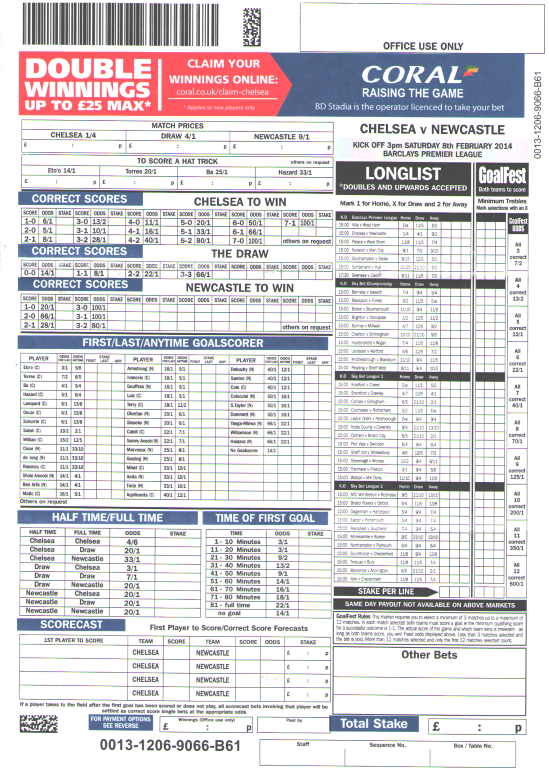
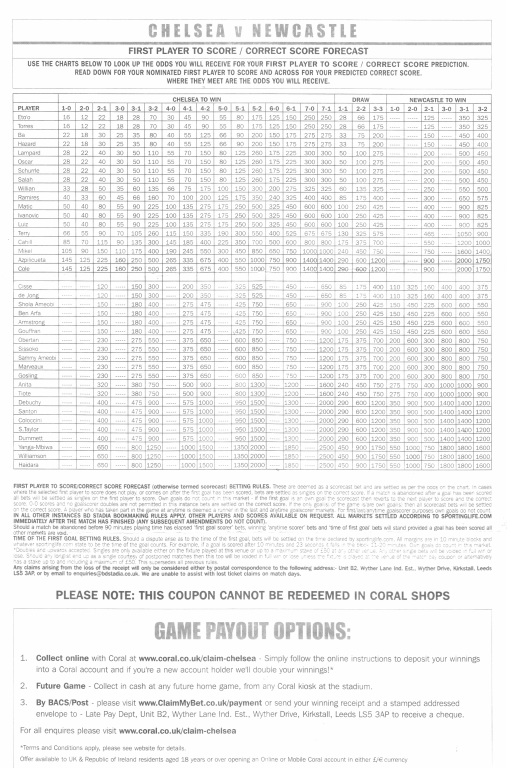
- Match (Chelsea wins, tie, Newcastle wins): -9.09%.
- Time of first goal (10 options): -10.84%
- Player to score first/last (40 options): -65.08%. I'm told that bets are returned on players who didn't play before the first score. These pushes would increase the value of the bet.
Conclusion
Let me wrap this up with the pros and cons about the casinos in London.Pros
- No smoking.
- Game rules equal or better than those in U.S.
- Rules of all the games posted in plain view.
- Friendly, professional and accommodating floor staff.
- Free non-alcoholic drinks and sometimes even free food.
- Casinos tend to be located in touristy areas.
- It seems every casino offers some kind of player reward program.
- Too small.
- Not much to do besides gamble.
- Fun factor is low.
- No free alcohol.
- "Tipping allowed" signs everywhere. I leave the U.S. in part to escape being shaken down for tips all the time.
Internal Links
External Links
- British casinos updated useful map showing locations of casinos in the UK.
- List of Games in UK Game rules for casino games in the UK.
- UK Gambling Commission.






